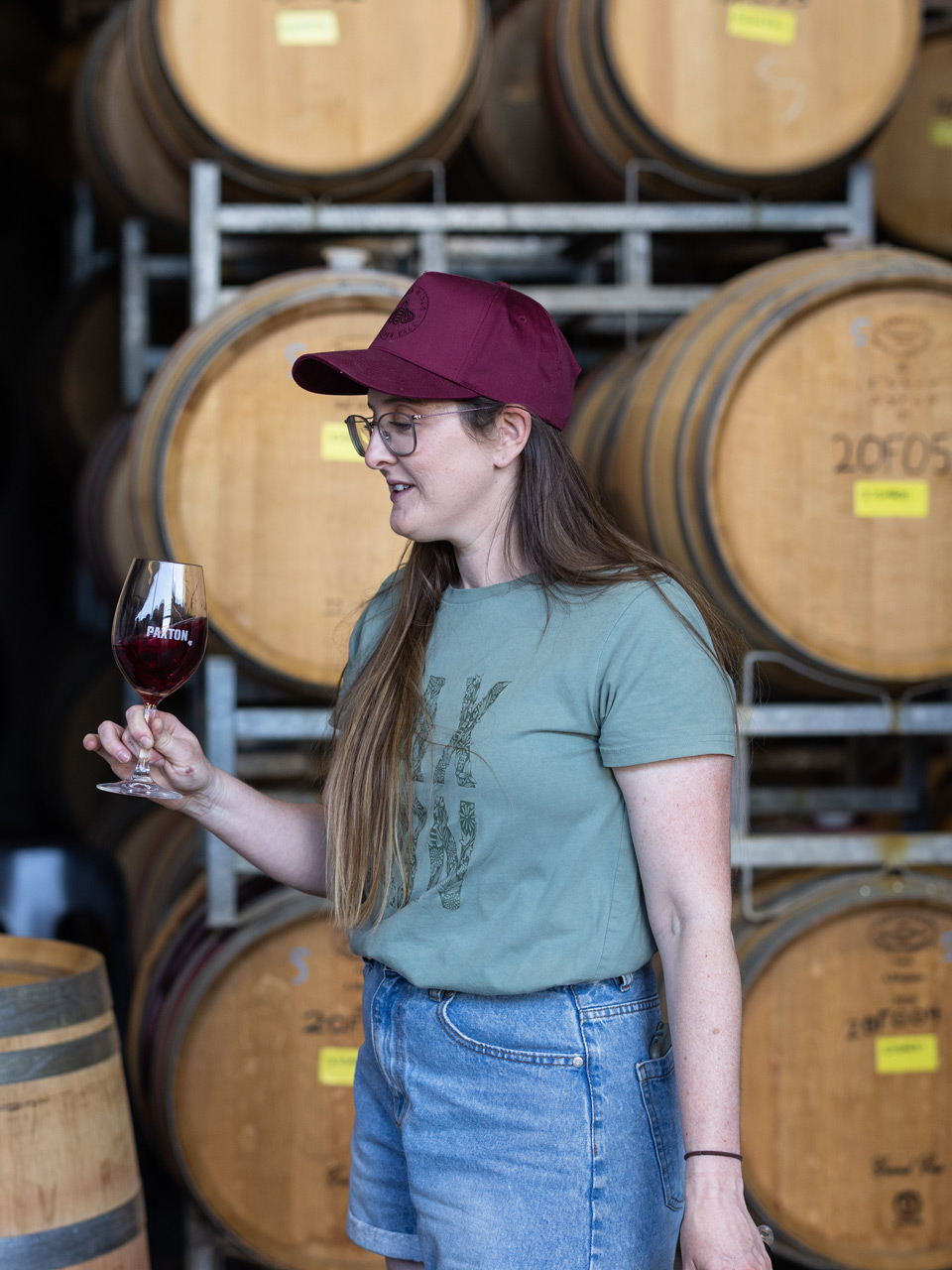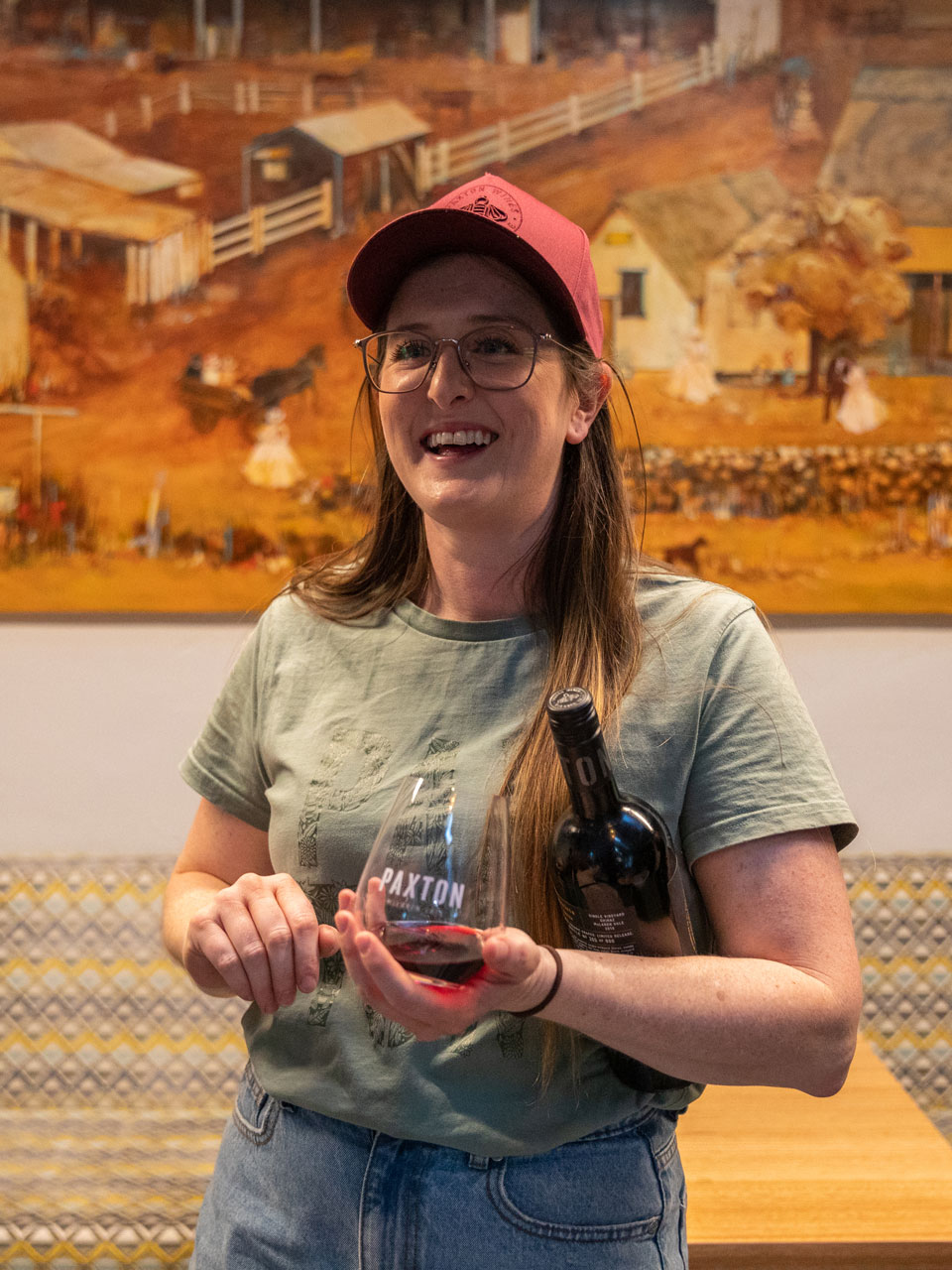After more than a decade working in Italy, Ashleigh Seymour came to work at McLaren Vale biodynamic pioneer Paxton in 2021. Now with three vintages under her belt, her magnetic attraction to the Vale – with its complex geology, Mediterranean climate, rich community and industry-leading commitment to organics and biodynamics – has seen her make it her long-term home. Seymour is employing large-format oak and amphora, while limiting winery additions to sulphur, and then only what is needed to be protective across the range that includes Vale hero varieties – shiraz, grenache, cabernet sauvignon – as well as those emerging, such as tempranillo and graciano, with more in the pipeline.
“I strive to make wines that breathe vitality, ooze drinkability and take you to a place that maybe you have been or maybe you are yet to discover,” says Seymour. “I think my wines are similar to some, in that they reflect place and parcel, though perhaps my commitment to curating and accompanying grapes and wine on their journey rather than continuously adjusting sets them apart.”
Today, well settled in at Paxton, Seymour is expanding the range with grand ambitions for the large vine holdings. “We are working to minimise our necessity to sell fruit to other wineries and focus on being the leader in accessible organic and biodynamic wines in Australia, innovating for the future by embracing technology in the vineyard and winery that will allow us to be more sustainable and most of all, make better wine.”
Seymour grew up in the east of Melbourne and Geelong, moving to Adelaide after a gap year to study winemaking in 2005. “I did an Internship at Peter Lehmann,” she says. “And throughout uni I worked at the Lane Vineyard, doing vintage there in 2009 before heading to Condrieu at André Perret.”
In 2010, she did a double vintage at Yarra Burn with Mark O’Callaghan and Bay of Fires with Peter Dredge. “I was then lured to Avignonesi for vintage in Montepulciano, Tuscany,” says Seymour. “That ended up being an 11-year rollercoaster, mentored by Giampaolo Chiettini and Adriano Zago, influenced by Elisabetta Foradori, and Maddalena Pasqua di Bisceglie from Musella. Here my life was deeply influenced by biodynamics.”
That rollercoaster came to a halt in late 2020. “Covid, young children, and time for a change meant Australia was calling, and I started at Paxton in January 2021,” says Seymour. That move, while no doubt a culture shock after over a decade in Italy, was softened by the philosophy at Paxton, with the sizeable vineyard holdings long ago certified as biodynamic.
With nearly 40 per cent of McLaren Vale’s vineyards certified organic or biodynamic, the highest percentage of any region in the country, Seymour was also in like-minded company. “I’ve always been fascinated by McLaren Vale,” she says, “with the plethora of soil types, from ancient rocky outcrops to deep sandy territory and many things in between. Above this though is the massive adoption of organic and biodynamic farming principles in the area, which is something I am deeply passionate about. And it’s Australia’s original home to sangiovese, another one of my obsessions after 11 years in Tuscany. I’m looking forward to having more sangiovese from this year’s plantings, and also new plantings of nero d’avola, fiano and vermentino – we might even go back to the future with chenin blanc.”
Seymour says that she feels a deep connection to the land and the community in McLaren Vale. “Although I’m not from here, I have reconnected with old university friends and made some inspiring new friends here,” she says. “In McLaren Vale, there is a zest for trying new things, a mishmash of people from different wine cultures and this definitely spurs me to test out a new mix-tape and not just listen to things on repeat.”
Beyond just improving wine quality, in Italy Seymour says that she was immersed in biodynamics. “Not just for the earth, soil and wine but as a way of life,” she says. “We breathe, feel and touch the different seasons, living in flow and not to the monotonous beat of sameness all year round. This is what inspires my winemaking – the basics of producing something magnificent which breathes the seasons of life on earth.”
McLaren Vale also seems especially suited to those farming methods, with the sea breezes a great advantage in minimising fungal disease pressure, but the warm conditions have their own challenges. “Sugar levels can creep up quite quickly here in McLaren Vale,” Seymour says. “So, having an intense sampling regime is super important. But most of all, I get out amongst the vines as much as possible and fill my belly full of grapes on a daily basis to make the best picking decisions. I am picking some parcels earlier when necessary and balancing that with later picked parcels for full flavour punch.”
In the winery, Seymour is looking to complex wines in subtle ways, with winemaking that never intrudes on the expression of fruit and site. “I love anfora [amphora], large-format oak, carbonic maceration, layer-cake ferments of whole bunch and destemmed, alternating layers,” she says. “Estate grown fruit is also an important one for me. It allows for total control, the possibility to experiment on all realms, and security. Granted there is less flexibility, but I think the good stuff outweighs that for me. Lightweight bottles and alternative packaging are also at the forefront of my mind, and we’re working on cans soon.”
Seymour says that she works with low sulphur levels and makes no other additions. “Fining is not something I’ve bothered with for a long time,” she says. “It’s all about getting it right, right at the beginning of the line, from pruning and vegetation management to picking decisions and keeping the wine under wraps on its journey from grapes to alcohol. There have been wines with problems, but it’s about managing the situation to consistently produce great quality wines and learning from those mishaps. The highs are high – oh so high. Sometimes, you’re not even sure if you can do it again, which is a great thing – nobody wants Coca-Cola wine.”




